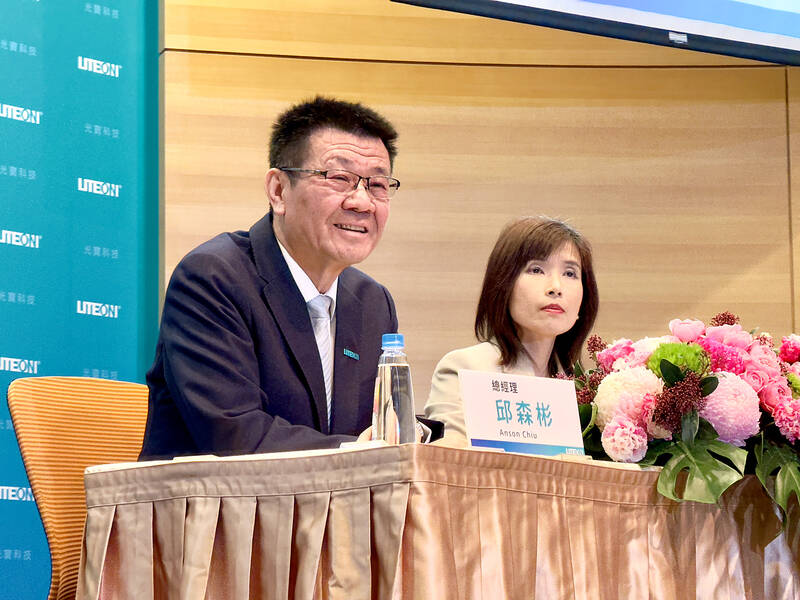Lite-On Technology Corp (光寶科技) expects its core businesses to post annual growth this quarter, primarily driven by accelerated shipments of high-end products related to cloud computing and optoelectronic semiconductors.
The electronic components manufacturer — whose products cover information technology and consumer electronics, cloud computing and artificial intelligence of things (AIoT), and optoelectronics — said sales this quarter would be lower than last quarter, but higher than the same period last year.
For this year, in addition to rising shipments of cloud computing power management systems for artificial intelligence (AI) servers, sales of high-end photocoupler applications in the machine vision, industrial and renewable energy sectors are also projected to grow quarter-on-quarter, Lite-On said in a statement.

Photo: Fang Wei-chieh, Taipei Times
“Lite-On continues to advance the progress of growth strategy in our core businesses. These core businesses will be the growth engines to drive the company back onto a positive growth trajectory in 2025,” Lite-On president Anson Chiu (邱森彬) said in the statement.
“With the advent of the new generation of AI chips, Lite-On’s cloud server integrated power solutions are expected to create growth momentum,” Chiu said, hinting at increasing shipments of high-end power shelves, battery-backup-unit systems and other advanced system integration solutions.
Contributions from those AI-related power supply products are expected to account for 14 to 15 percent of the company’s sales this year, compared with 7 to 8 percent last year, Chiu said.
As for integrated solutions for liquid cooling and cabinet systems for severs, he said their contribution would be less than 1 percent of its total sales this year, as this new business is still in its preliminary stage, but such products are expected to become an important growth driver in the next two to three years.
Chiu’s remarks came as the company yesterday reported weaker-than-expected earnings per share (EPS) of NT$1.33 for last year’s October-to-December quarter due to slower improvement in both gross margin and operating margin, which fell on an annual basis to 21.3 percent and 9.1 percent respectively in the quarter.
Yuanta Securities Investment Consulting Co (元大投顧) had expected the company to post fourth-quarter EPS of NT$1.6, with gross margin of 22.9 percent and operating margin of 9.26 percent.
Lite-On posted a retreat in annual sales last year, down 7.56 percent to NT$137.12 billion (US$4.18 billion), despite a 3.76 percent increase in the final quarter of the year, at NT$38.3 billion, on the back of more than 20 percent growth in the cloud computing and AIoT business.
With last year’s total EPS coming in at NT$5.1, down from NT$6.36 the previous year, the company’s board of directors approved a plan to distribute a cash dividend of NT$4.5 per share, the company said.
That suggests a payout ratio of 86.31 percent.
In response to the US tariff policy and to comply with global diversification trends, coupled with the robust demand for battery-backup-unit systems, the company would continue to expand its production facilities in Dallas while also providing electric vehicle charging pile-related products, Chiu said.
Capacity expansions at its plants in Kaohsiung and in Quang Ninh Province in northern Vietnam are also proceeding as scheduled, he said.

To many, Tatu City on the outskirts of Nairobi looks like a success. The first city entirely built by a private company to be operational in east Africa, with about 25,000 people living and working there, it accounts for about two-thirds of all foreign investment in Kenya. Its low-tax status has attracted more than 100 businesses including Heineken, coffee brand Dormans, and the biggest call-center and cold-chain transport firms in the region. However, to some local politicians, Tatu City has looked more like a target for extortion. A parade of governors have demanded land worth millions of dollars in exchange

An Indonesian animated movie is smashing regional box office records and could be set for wider success as it prepares to open beyond the Southeast Asian archipelago’s silver screens. Jumbo — a film based on the adventures of main character, Don, a large orphaned Indonesian boy facing bullying at school — last month became the highest-grossing Southeast Asian animated film, raking in more than US$8 million. Released at the end of March to coincide with the Eid holidays after the Islamic fasting month of Ramadan, the movie has hit 8 million ticket sales, the third-highest in Indonesian cinema history, Film

Taiwan Semiconductor Manufacturing Co’s (TSMC, 台積電) revenue jumped 48 percent last month, underscoring how electronics firms scrambled to acquire essential components before global tariffs took effect. The main chipmaker for Apple Inc and Nvidia Corp reported monthly sales of NT$349.6 billion (US$11.6 billion). That compares with the average analysts’ estimate for a 38 percent rise in second-quarter revenue. US President Donald Trump’s trade war is prompting economists to retool GDP forecasts worldwide, casting doubt over the outlook for everything from iPhone demand to computing and datacenter construction. However, TSMC — a barometer for global tech spending given its central role in the

Alchip Technologies Ltd (世芯), an application-specific integrated circuit (ASIC) designer specializing in server chips, expects revenue to decline this year due to sagging demand for 5-nanometer artificial intelligence (AI) chips from a North America-based major customer, a company executive said yesterday. That would be the first contraction in revenue for Alchip as it has been enjoying strong revenue growth over the past few years, benefiting from cloud-service providers’ moves to reduce dependence on Nvidia Corp’s expensive AI chips by building their own AI accelerator by outsourcing chip design. The 5-nanometer chip was supposed to be a new growth engine as the lifecycle